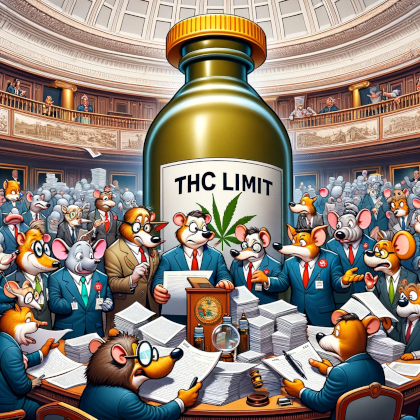
Florida Lawmakers Proactively Approve THC Limits on Recreational Cannabis Products
We’ve covered a lot of the political landscape surrounding Florida’s cannabis industry in the last few months, but things are changing quickly. Governor Ron DeSantis himself has expressed optimism about cannabis in Florida and believes that recreational cannabis will make it onto the November ballot this year.
However, Florida seems to be counting its chickens before they hatch…
Recently, the state’s House Healthcare Regulation Subcommittee approved an amended bill that seeks to preemptively limit the THC content in recreational cannabis products— even though it hasn’t even made it to the ballot.
The focal point of this development is House Bill 1269 (HB 1269), which underwent significant amendments before being approved 13-4 by the House Healthcare Regulation Subcommittee.
Originally, the bill aimed to impose a 10% THC cap on flower. However, an amendment sponsored by Rep. Ralph Massullo significantly raised the proposed THC cap for smokable flower to 30%. The bill also includes provisions such as a 60% THC limit on all other cannabis products and a 10mg THC serving size for edibles, with a maximum of 200 mg per package.
Massullo, the bill’s sponsor, defended these THC limits by highlighting the importance of understanding the potential long-term benefits and harms of high-potency THC products. It was a concern when medical was legalized, but now with recreational looming on the horizon, his concern and the concerns of others like him is that it’ll be too accessible to at-risk populations in Florida. Other lawmakers supported the bill, highlighting the importance of proactive legislation to prevent potential issues associated with low THC limits and the illicit market.
Massullo’s stance is firmly rooted in the responsibility of lawmakers to ensure public safety and maintain a long-term perspective. He went on to emphasize that these limits would only come into effect if a constitutional amendment for recreational cannabis happens after voter approval. Which, as we (and the governor) have said, is a huge possibility.
Last month, the Florida Chamber of Commerce released a poll showing that voters support recreational marijuana. However, 60% of voters would need to approve it in order for it to pass. Regardless, another poll form the University of North Florida found that a whopping 67% of voters back the proposal.

Despite the subcommittee’s approval of this preemptive bill, some members don’t agree. Rep. Robin Bartleman opposed the bill, advocating for a more comprehensive approach to adult-use cannabis regulations instead of “piecemeal” solutions. Rep. Kelly Skidmore echoed these sentiments, emphasizing the need for a broader discussion on regulation, not just focusing on THC content itself.
More or less, it’s a huge case of another state thinking about recreational marijuana regulation and trying to reinvent the wheel. The passage of HB 1269 raises questions about how Florida will regulate recreational cannabis. Many factors, including licensing, distribution, and additional regulations, need consideration, as emphasized by Skidmore. The debate over THC limits is just one aspect of the larger conversation that really can’t be considered until Florida passes recreational weed.
While the legalization measure itself has not officially qualified for November’s ballot, the governor expressed optimism regarding its outcome in the Supreme Court, despite opposition from the state’s attorney general. If approved, this measure would change the state constitution, allowing existing medical cannabis companies to sell marijuana to adults over 21. However, home cultivation would not be permitted, and equity provisions are notably absent from the proposal.
At the end of the day, Florida is still figuring things out. While this bill may be approved now, perspectives may shift if recreational cannabis is legalized in Florida and new problems spring up. The approval of THC limits on recreational cannabis products is one aspect of a larger conversation that will shape the future of cannabis policy in the state. That said, THC limitations may be the least of the lawmakers’ concerns moving forward, so really, only time will tell.
As voters await the November ballot, the discussions surrounding regulation, taxation, and public safety will continue to evolve, ultimately determining the fate of recreational cannabis in Florida.








